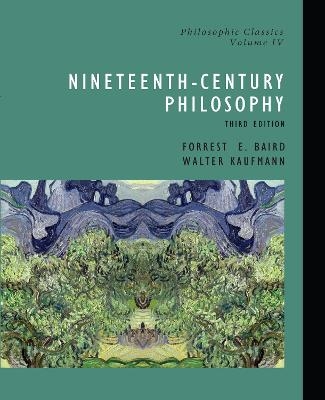
Philosophic Classics, Volume IV
Routledge (Verlag)
978-0-13-048550-2 (ISBN)
This anthology of readings in contemporary Western philosophy focuses on 19th-century philosophers who represent a variety of responses to the issue of their day: whether or not there was a knowable, nonhuman rational order upon which thinking persons could willfully choose to act. The selections are readable and accessible, yet remain faithful to the original works. Accompanying the text are drawings, diagrams, photographs, and a timeline; all of which allow the reader to really study the major philosophical thinkers of the 19th-century: Bentham, Wollstonecraft, Fichte, Hegel, Schopenhauer, Comte, Feuerbach, Mill, Kierkegaard, Marx, Peirce, James, and Nietzche. For anyone interested in owning a collection of works from the greatest philosophical thinkers in the 19th-century.
Forrest E. Baird is Professor and Chair of Philosophy & Religion at Whitworth College, Spokane, Washington.
Jeremy Bentham.
Introduction to the Principles of Morals and Legislation (Chapters 1-4).
Mary Wollstonecraft.
A Vindication of the Rights of Woman (Chapter 6).
Johann Gottlieb Fichte.
On the Foundation of Our Belief in a Divine Government of the Universe. The Vocation of Man (Book III).
G.W.F. Hegel.
Phenomenology of Spirit (“Independence and Dependence of Self-Consciousness: Relations of Master and Servant”). Encyclopaedia (Introduction). Who Thinks Abstractly? Reason in History: A General Introduction to the Philosophy of History (Chapters 1-3). Lectures on the History of Philosophy (“The Final Result”).
Arthur Schopenhauer.
The World as Will and Idea (Chapter 19).
Auguste Comte.
Introduction to Positive Philosophy (“The Nature and Importance of the Positive Philosophy”).
Ludwig Feuerbach.
The Essence of Christianity (Chapter 1).
John Stuart Mill.
Utilitarianism. On Liberty. The Subjection of Women (Selections from Chapter 1).
Søren Kierkegaard.
Fear and Trembling (“Is There a Teleological Suspension of the Ethical?”). Concluding Unscientific Postscript (Section I, Chapter 2; Section II, Chapter 2). The Present Age (in part).
Karl Marx.
Economic and Philosophic Manuscripts of 1844 (“Alienated Labor,” “Private and Communism Property,” and “Critique of Hegelian Dialectic and Philosophy in General”). Manifesto of the Communist Party (Chapters 1, 4). The German Ideology (“Ideology in General, German Ideology in Particular”). A Contribution to the Critique of Political Economy (Author's Preface and Introduction).
Charles Sanders Peirce.
The Fixation of Belief. How to Make Our Ideas Clear.
William James.
The Will to Believe. Pragmatism (Lectures, I, II, IV, VI).
Friedrich Nietzsche.
The Birth of Tragedy (Chapters I-III, XV, XXV). The Genealogy of Morality (“Good and Evil,” “Good and Bad”). Thus Spoke Zarathustra (Part I, Chapters 1-3). Twilight of the Idols (Selections). The Will to Power (§1067). The Anti-Christ (First Book, Chapters 2-7, 62).
| Erscheint lt. Verlag | 11.9.2002 |
|---|---|
| Reihe/Serie | Philosophic Classics |
| Verlagsort | New York |
| Sprache | englisch |
| Maße | 178 x 235 mm |
| Gewicht | 816 g |
| Themenwelt | Geisteswissenschaften ► Philosophie ► Geschichte der Philosophie |
| Geisteswissenschaften ► Philosophie ► Philosophie der Neuzeit | |
| ISBN-10 | 0-13-048550-0 / 0130485500 |
| ISBN-13 | 978-0-13-048550-2 / 9780130485502 |
| Zustand | Neuware |
| Haben Sie eine Frage zum Produkt? |
aus dem Bereich


